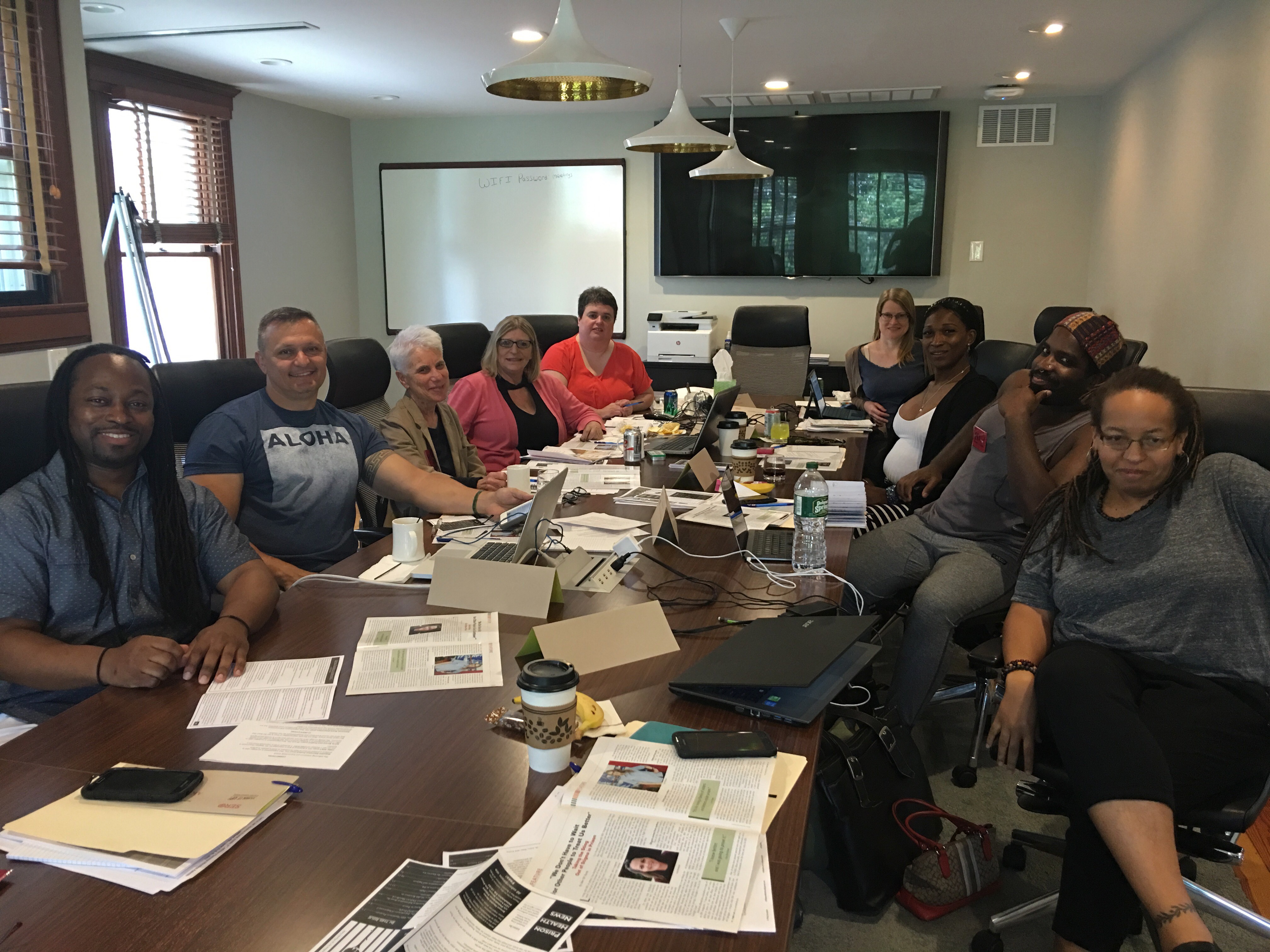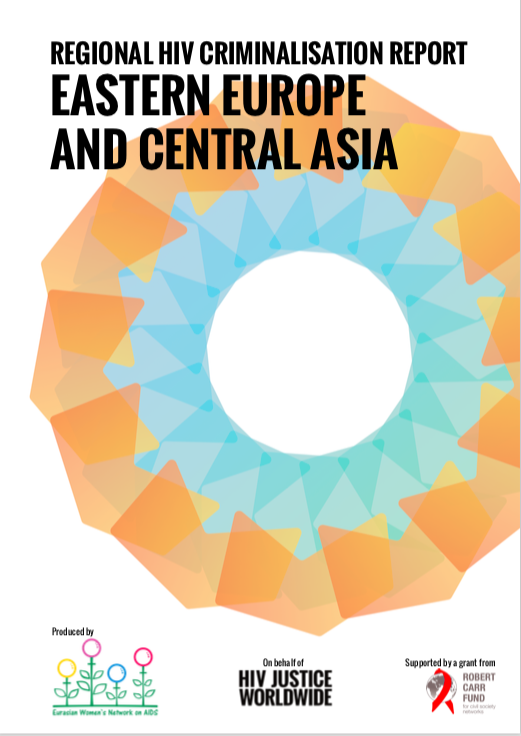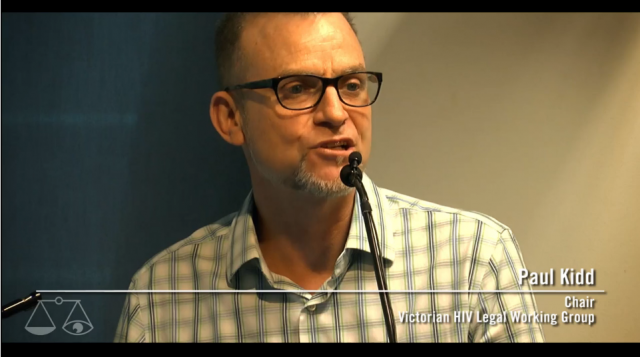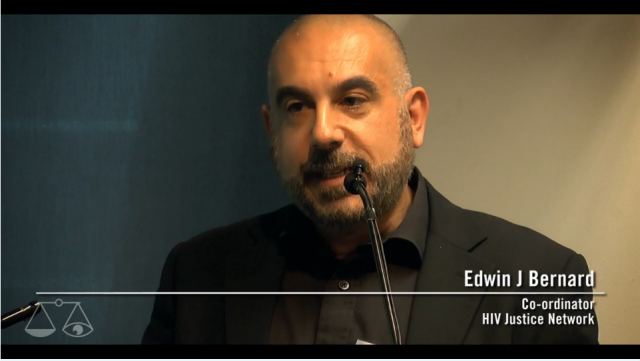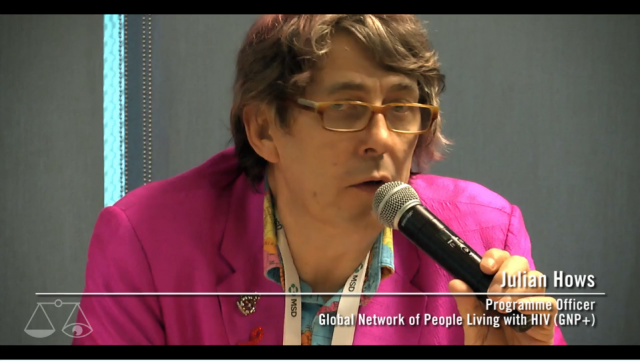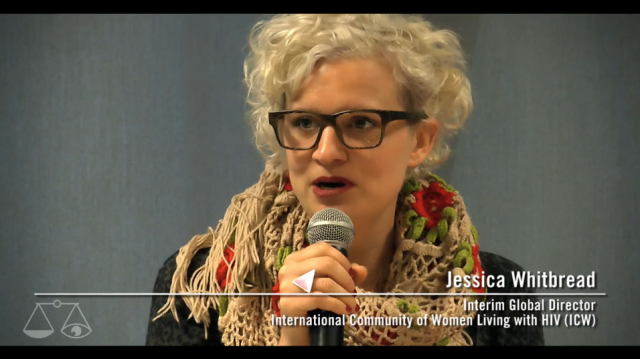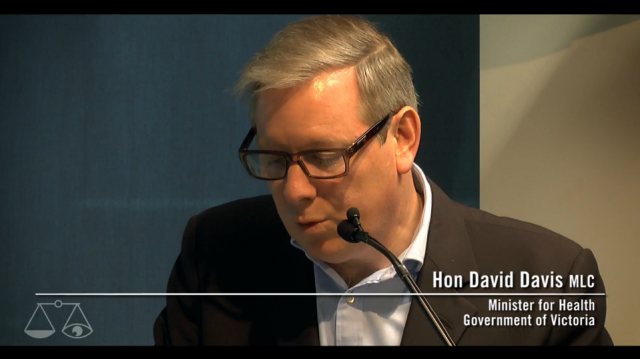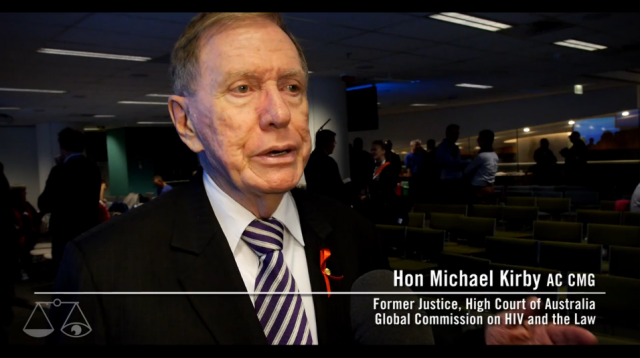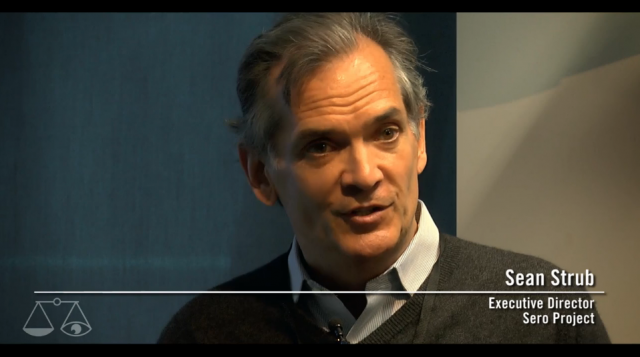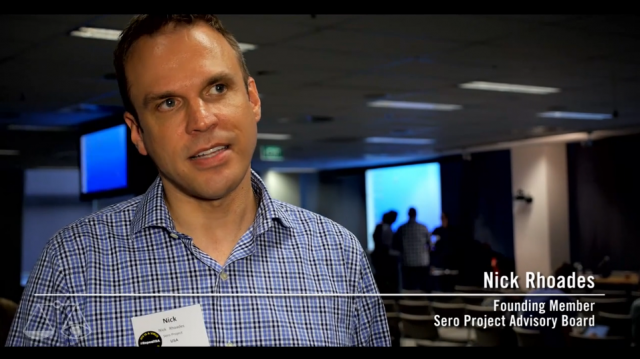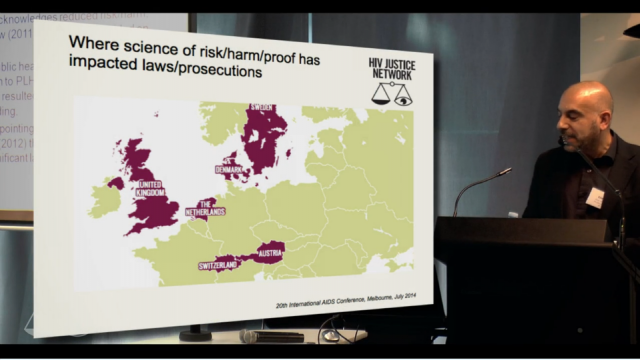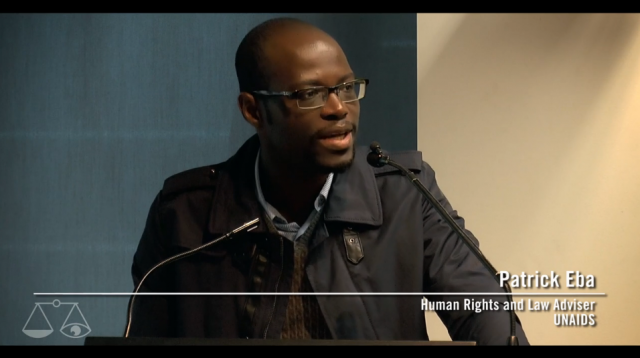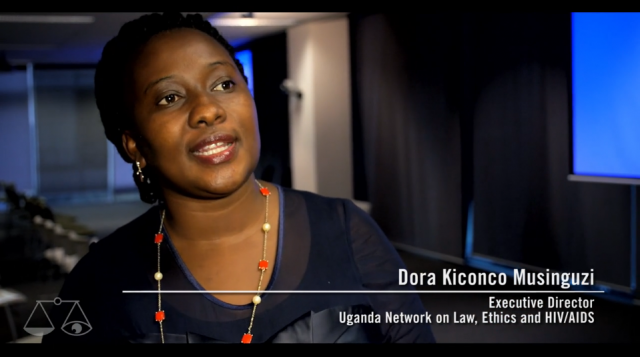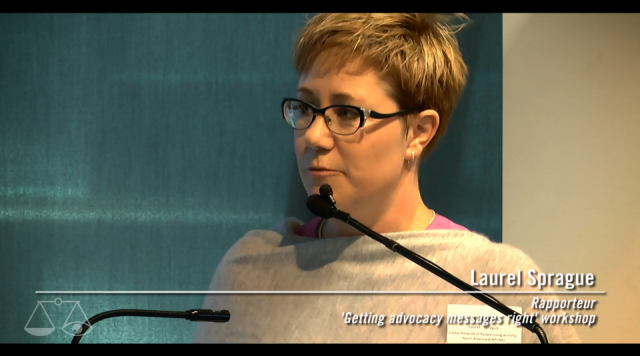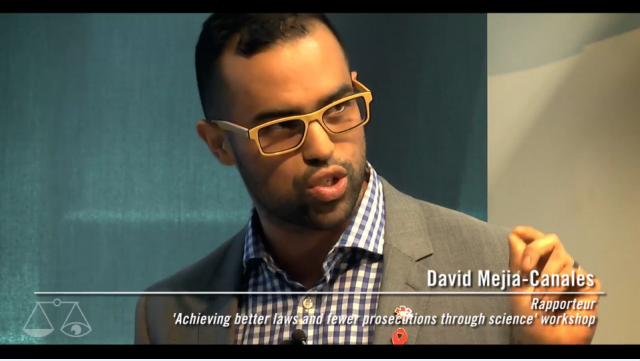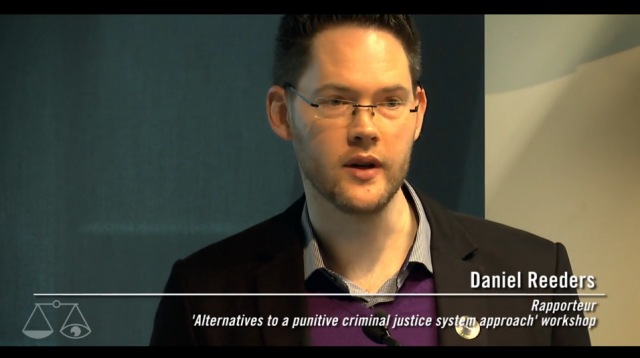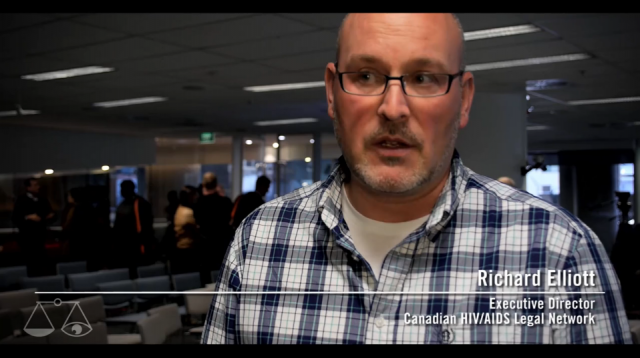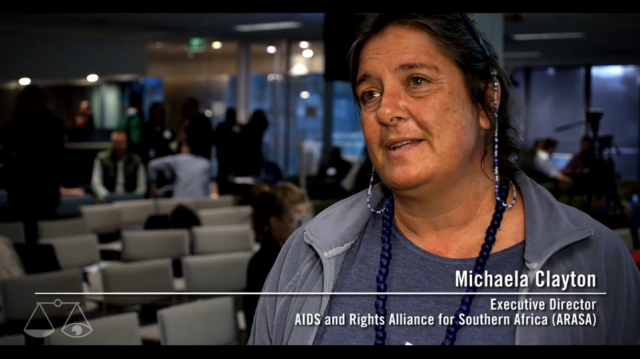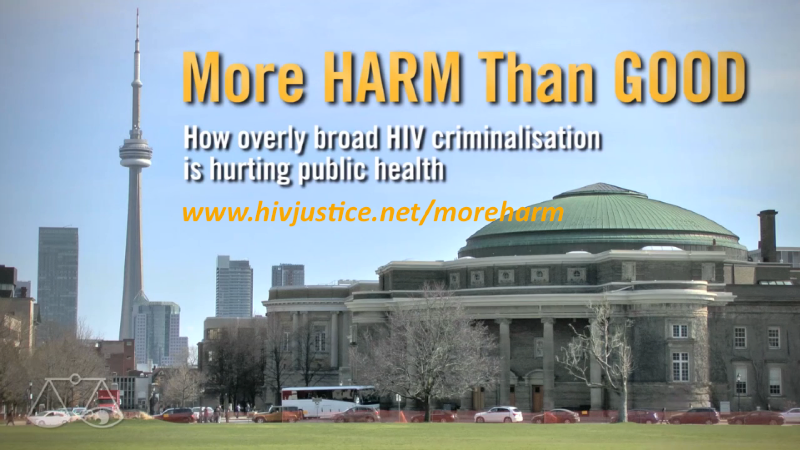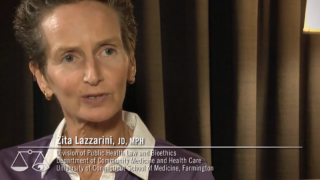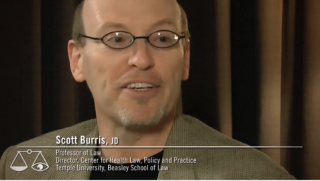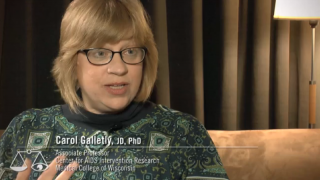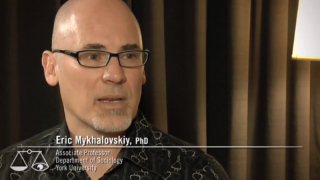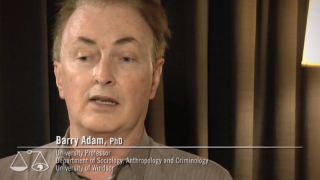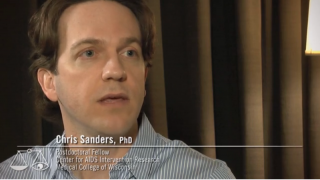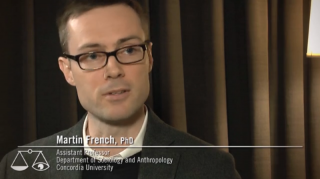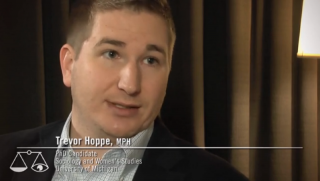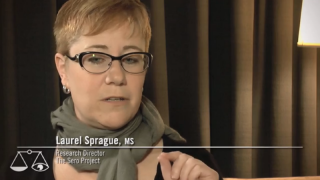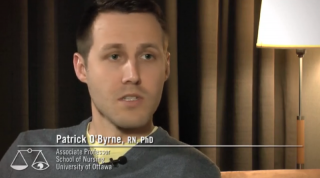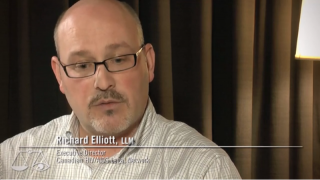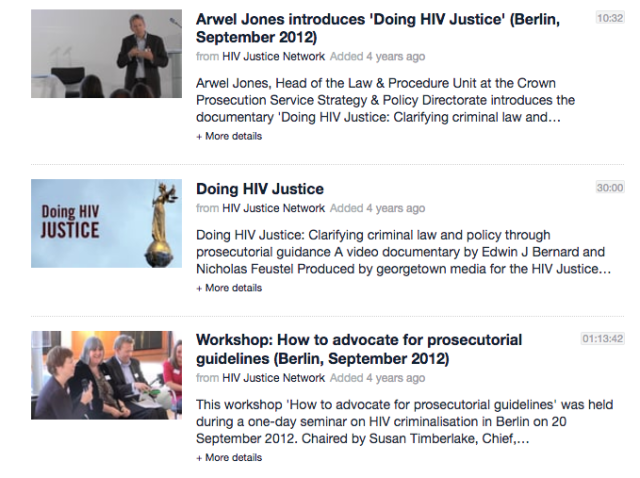Sex, Lies and HIV: When What You Don’t Tell Your Partner Is a Crime
by Sergio Hernandez, Special to ProPublica, Dec. 1, 2013.
This story was co-published with BuzzFeed.
[Un sommaire en français est aussi disponible ici]
Nick Rhoades was clerking at a Family Video store in Waverly, Iowa, one summer afternoon in 2008 when three armed detectives appeared, escorted him to a local hospital and ordered nurses to draw his blood. A dozen miles away, his mother and stepfather looked on as local sheriff’s deputies searched their home for drugs ó not illegal drugs, but lifesaving prescription medications.
Lab results and a bottle of pills found in the Rhoades’ refrigerator confirmed the detectives’ suspicions: Nick Rhoades was HIV-positive.
Almost a year later, in a Black Hawk County courtroom, Judge Bradley Harris peered down at Rhoades from his bench.
“One thing that makes this case difficult is you don’t look like our usual criminals,” Harris said. “Often times for the court it is easy to tell when someone is dangerous. They pull the gun. They have done an armed robbery. But you created a situation that was just as dangerous as anyone who did that.”
The judge meted out Rhoades’ sentence: 25 years in prison.
His crime: having sex without first disclosing he had HIV.
Officially, the charge, buried in Chapter 709 of the Iowa code, is “criminal transmission of HIV.” But no transmission had occurred. The man Rhoades had sex with, 22-year-old Adam Plendl, had not contracted the virus.
That’s not a surprise, because Rhoades used a condom.
And medical records show he was taking antiviral drugs that suppressed his HIV, making transmission extremely unlikely. A national group of AIDS public health officials later submitted a brief estimating that the odds of Rhoades infecting Plendl were “likely zero or near zero.”
After his lawyers petitioned the court, Rhoades’ prison sentence was changed to five years’ probation. But for the rest of his life ó he is 39 ó he will remain registered as an aggravated sex offender who cannot be alone with anyone under the age of 14, not even his nieces and nephews.
Rhoades’ is not an isolated case. Over the last decade, there have been at least 541 cases in which people were convicted of, or pleaded guilty to, criminal charges for not disclosing that they were HIV-positive, according to a ProPublica analysis of records from 19 states. The national tally is surely higher, because at least 35 states have laws that specifically criminalize exposing another person to HIV. In 29 states, it is a felony. None of the laws require transmission to occur.
Defendants in these cases were often sentenced to years ó sometimes decades ó in prison, even when they used a condom or took other precautions against infecting their partners. In 60 cases for which extensive documentation could be obtained, ProPublica found just four involving complainants who actually became infected with HIV. Even in such cases, it can be hard to prove who transmitted the virus without genetic tests matching the accused’s HIV strain to their accuser’s.
People with HIV have even done time for spitting, scratching or biting. According to the federal Centers for Disease Control and Prevention, spitting and scratching cannot transmit HIV, and transmission through biting “is very rare and involves very specific circumstances” ó namely, “severe trauma with extensive tissue damage and the presence of blood.”
Many law enforcement officials and legislators defend these laws, saying they deter people from spreading the virus and set a standard for disclosure and precautions in an ongoing epidemic.
“Shifting the burden of HIV disclosure from the infected person, who is aware of a known danger, to one who is completely unaware of their partner’s condition smacks of a ëblame the victim’ sort of mentality,” Jerry Vander Sanden, a prosecutor in Linn County, Iowa, wrote in an email to ProPublica. “It would be like telling a rape victim that they should have been more careful.”
Even many people with HIV support the laws. In a recent survey of HIV-positive people in New Jersey, 90 percent said that people with the virus bore most of the responsibility to protect their partners. More than half approved of the kind of laws that resulted in Rhoades’ sentence.
But some health and legal experts say using criminal penalties to curtail the epidemic could backfire and fuel the spread of HIV. According to the CDC, 1.1 million Americans are currently living with HIV, but one-fifth of them don’t know it. And studies show that about half of newly infected people got the virus from those who didn’t know they had HIV. So relying on a partner to know, let alone disclose, their HIV status is a risky proposition.
The laws, these experts say, could exacerbate this problem: If people can be imprisoned for knowingly exposing others to HIV, their best defense may be ignorance. Such laws, then, provide a powerful disincentive for citizens to get tested and learn if they carry the virus.
The laws “place all of the responsibility on one party: the party that’s HIV-positive,” said Scott Schoettes, a lawyer who supervises HIV litigation for Lambda Legal, a national gay-rights advocacy group. “And they lull people who are not HIV-positive ó or at least think they are not HIV-positive ó into believing that they don’t have to do anything. They can just wait for their partner to reveal their status and not, instead, take steps to protect themselves.”
Schoettes also says that the laws unfairly single out HIV, further stigmatizing and reinforcing misconceptions about living with the virus.
“There’s no reason why we should be singling out HIV for this kind of treatment,” he said. “It’s based in just a lot of fear and misconception.”
Being HIV-positive can still carry a powerful stigma. Since July 2010, the U.S. Department of Justice has opened at least 49 investigations into alleged HIV discrimination. The department has won settlements from state prisons, medical clinics, schools, funeral homes, insurance companies, day care centers and even alcohol rehab centers for discriminating against HIV-positive people. Individuals with HIV may also fear that news of their status will spread to third parties, leading to rejection, embarrassment or ostracism for themselves or even their loved ones.
In September, a disability rights group accused the Pea Ridge, Ark., school district of kicking out three siblings after officials learned that members of their family had HIV. The family’s lawyers declined to comment. The school district did not respond to requests for interviews but issued a statement acknowledging that it had “required some students to provide test results regarding their HIV status in order to formulate a safe and appropriate education plan for those children.”
In romantic or sexual settings, people with HIV often report fear of rejection, abandonment and stigmatization.
“My first girlfriend in middle school ó her mom banned her from seeing me, and it took me five years before I felt comfortable to try again,” said Reed Vreeland, a 27-year-old New Yorker who was born with HIV. Vreeland works as the communications coordinator for the Sero Project, a nonprofit advocacy group that campaigns against HIV exposure laws, which it denounces as “HIV criminalization.”
In 2006, Vreeland started dating a classmate at Bard College in upstate New York. He disclosed his HIV status on their second date.
“What’s going through your head is being scared of being rejected,” he said. “It’s scary to give someone that power.”
Vreeland and his girlfriend continued to date. Last spring, they married at a ceremony in the Bronx. “It took me a long time to propose, because I thought I would die,” he recalled. “I was saying, ëWell, OK, why should I propose if I’m scared of dying in 10 years? And if we do have a kid, then I might die and leave my kid without a father, like I grew up without a mother.'”
The fear is “choking” and “silencing,” he said. “You’re conscious that saying three letters will change the way people will see you.”
In some cases, people with HIV have been met with violence ó and even death ó after disclosing their status. Last month, in Dallas, 37-year-old Larry Dunn was sentenced to 40 years in prison for murdering his HIV-positive lover. Police said he used a kitchen knife to stab and kill Cicely Bolden, a 28-year-old mother of two, after she told him about her HIV status. “She killed me,” he told investigators, according to his arrest warrant, “so I killed her.”
Until recently, criminal punishment was virtually unheard of for infectious diseases other than HIV. Federal and state officials have the authority to quarantine the sick to contain epidemics, but this power was typically granted to health authorities, who are versed in the latest science, not police and prosecutors. Very few criminal statutes take aim at diseases. At least two states have catchall laws against exposing others to “communicable diseases,” but only if exposure happens through routes most commonly associated with HIV, such as sex, sharing needles or donating blood. And while some states have laws that specifically punish exposure to tuberculosis, syphilis or “venereal diseases,” HIV exposure is almost always punished more severely.
But since 2007, three states have added hepatitis B and C to laws criminalizing HIV exposure. Those diseases are most prevalent among the same groups of marginalized people most at risk for HIV: intravenous drug users; gay men, especially those who are black or Latino; and black women.
Yet the laws may be unnecessary. In rare cases when someone intentionally tries to spread a virus, prosecutors have been able to put them away using ordinary criminal laws, such as assault or reckless endangerment. In 1997, a New York man named Nushawn Williams was accused of deliberately infecting at least 13 people, including two underage girls, with HIV. Williams pleaded guilty to two counts of statutory rape and one count of reckless endangerment. When his 12-year sentence ended in 2010, state officials kept him confined under laws that allow dangerous psychiatric patients to be locked up. He remains behind bars.
In Iowa, Rhoades’ case has prompted some lawmakers to reconsider whether exposing someone to HIV should carry such a heavy punishment.
“Putting somebody in prison for 25 years when they didn’t even transmit HIV is the most absurd thing that the state could be doing,” said Matt McCoy, an Iowa state senator who has introduced legislation to reduce the penalties. “It’s medieval.”
Even Plendl, the man Rhoades had sex with, thinks the law is too harsh. “Do I think he needs to be locked up forever?” Plendl asked. “No. Do I think these laws need to be revisited? Yes.”
* * *
In 1986, scientists had just christened the virus that causes AIDS, the human immunodeficiency virus, or HIV. The government had already logged more than 16,000 AIDS cases and 8,000 deaths since the American epidemic began, mostly among gay men and drug users. At the time, not a single drug was approved to target HIV, and the diagnosis was, for many, a death warrant.
In a panic, state lawmakers across the country ó starting with Kernan “Skip” Hand, a Republican state legislator from Jefferson Parish, La. ó began to take a law-and-order approach to keeping HIV out of their communities.
Hand’s bill, the first of its kind in the country, passed in 1987. It imposed a sentence of up to 10 years in prison and a $5,000 fine on anyone who “intentionally” exposed a person to HIV without their “knowing and lawful consent.”
The next year, Georgia adopted a statute that made no mention of intent; it could be applied to anyone who did not disclose their HIV status before having sex or sharing needles.
Share Your Views
In 1989, the American Legislative Exchange Council, or ALEC ó a conservative nonprofit that develops policy positions and drafts model bills for state legislatures ó assembled a special HIV task force, which published a set of prototype statutes on subjects ranging from mandatory testing to insurance coverage. Buried in Chapter 6, alongside a proposed emergency quarantine law, was a single-page bill called the “HIV Assault Act,” which became the template for state HIV exposure laws for the next decade.
Alan Smith, who served on the committee that drafted ALEC’s model HIV bills and later served as ALEC’s executive director, recalled members’ concerns that people might intentionally try to spread the virus to drive more funding toward medical research.
“I guess there was a worry that there would be a lot worse disease than it could’ve been if people were actually on a mission to make sure more people got it so more research money could be devoted to curing it,” Smith said.
A turning point came in 1990, when Congress inadvertently gave the criminalization effort a boost by passing the Ryan White CARE Act, a landmark law that funded HIV/AIDS services.
In the run up to passage, Jesse Helms ó the late Republican senator from North Carolina ó proposed an amendment that would have criminalized HIV-positive health care workers who failed to disclose their status to patients and made it a federal crime for anyone with HIV, as well as anyone who had ever used injection drugs or engaged in prostitution, to donate, sell or attempt to donate or sell blood, semen, tissues, organs or bodily fluids. (The act itself was named after a hemophiliac teenager from Indiana who became a national poster child for the AIDS crisis when he was expelled from middle school after contracting HIV from a tainted blood treatment.)
But Ted Kennedy, the late Democratic senator from Massachusetts and the act’s primary sponsor, offered an alternative: Defund services unless states passed legislation to safeguard their blood and organ donation networks.
“No state,” Kennedy said from the Senate floor, describing the compromise amendment, “could receive funds under the act, unless laws are in place to prosecute a person who donates blood or organs if one knows that he or she is infected with the HIV virus and knows the risk of transmission from making such a donation.”
Waiting in the wings was the ALEC bill, which outlawed blood and tissue donations by people with HIV and also made it a crime for anyone with HIV to have “intimate contact” with another person without first disclosing his or her HIV status. By 1993, versions of the HIV Assault Act had been passed in Florida and introduced in Iowa, Michigan, Mississippi, New York, Nevada, Tennessee and Virginia. By the end of the decade, copycat bills had passed in nine states, including Iowa, which enacted its law in 1998.
A side-by-side comparison shows that the Iowa law was almost identical to ALEC’s HIV Assault Act. Iowa’s only major change was to its name: The “HIV Assault Act” became the “Criminal Transmission of Human Immunodeficiency Virus” law, itself a misnomer because transmission isn’t necessary for the charge to stick.
When Congress reauthorized the Ryan White CARE Act in 2000, it dropped the criminalization provision for blood and tissue donations. Nevertheless, since then, at least 14 bills have been passed across the country either enacting new HIV exposure laws or toughening existing laws’ penalties, especially when the victim is a police or corrections officer.
In 2011, for example, Nebraska passed a measure that made biting or spitting on public safety officers a misdemeanor punishable by one year in jail and a $1,000 fine ó unless the offender is HIV-positive. Then the same crime is a felony punishable by up to five years in prison and a $10,000 fine.
At the same time, three states ó Mississippi, Nebraska and Tennessee ó have criminalized exposing someone to hepatitis B or C. In Nebraska and Tennessee, this is a misdemeanor, while HIV exposure is a felony, even though, according to the World Health Organization, hepatitis B is up to 100 times more infectious than HIV.
* * *
On June 26, 2008, Nick Rhoades was at home in Plainfield, Iowa, when he received a chat invitation on Gay.com, a dating and social networking site. The sender, Adam Plendl, was a 22-year-old student at the University of Northern Iowa.
At 3 that morning, the men struck up a conversation. Plendl invited Rhoades to meet him in Cedar Falls, roughly 30 miles south of Plainfield, where Plendl had just moved into a new apartment several blocks from campus. The two men spent the next several hours drinking pomegranate vodka martinis, smoking marijuana, unpacking Plendl’s belongings and bonding over their struggles with bipolar disorder. Eventually, they had sex.
A few nights later, Plendl was sharing a midnight cigarette with Jordan Brown, a friend who had learned through the grapevine that Rhoades was, as he later described it to police, “sick.” Plendl panicked at the possibility that he had been exposed to HIV. He said he “flew out of the house” to the emergency room of the nearby Sartori Memorial Hospital.
As he tells it, Plendl never planned to press charges against Rhoades. He went to the hospital seeking a doctor who could prescribe him a short-term, emergency regimen of HIV drugs that, if started within 72 hours of exposure to the virus, can stop infection from taking root. But when the Sartori staff seemed clueless about the procedure, Plendl went to the emergency room at Covenant Medical Center in the neighboring town of Waterloo.
There, Brandy Weida-Cooper, a registered nurse who was working the graveyard shift, admitted Plendl to the ER and, records show, made the call to involve police. “I never called the police,” Plendl said. “Yes, when I was asked questions, I provided them answers. But I did not call the police; the hospital did.”
In a telephone interview, Weida-Cooper declined to explain what spurred her decision to alert authorities. (A spokesman for Wheaton Franciscan Healthcare, the Roman Catholic nonprofit that owns both Covenant and Sartori, also declined to comment.) In any case, by 4:02 a.m., a Cedar Falls patrol officer was standing in Weida-Cooper’s emergency room, ready to take Plendl’s statement.
* * *
The more than 500 instances documented by ProPublica in which people have been convicted of or pleaded guilty to HIV-specific laws since 2003 represents one of the largest collections of such cases ever assembled. Still, it is almost certainly a substantial undercount.
The data was drawn from more than 1,300 records, including court files, police reports and registries of sex offenders and prisoners. Some law enforcement agencies refused to provide records about their cases or redacted names and case numbers, saying that the suspects’ HIV status ó once used to prove their criminal guilt ó should be protected out of concern for their medical privacy. (A full breakdown of the data is here.)
Some of the cases were originally compiled through public records requests made by the Sero Project; most were independently obtained by ProPublica.
Despite its limitations, the material creates a rough portrait of how these laws have been applied through the years.
ProPublica was able to find just four cases that involved lawmakers’ original concerns about protecting the blood and organ supply. Two of these four resulted in a conviction or guilty plea, one was dismissed, and the outcome of the last could not be determined.
For cases in which the route of potential transmission could be determined, the overwhelming majority involved sex. The circumstances and relationships in those cases confound stereotypes or preconceived notions: HIV-positive defendants and their accusers have included gay and straight couples in one-night stands, dating relationships or even years of marriage. Cases have involved instances of sex between prisoners, rape and child abuse.
In Waterloo, Iowa, 42-year-old Donald Bogardus, a church-going, HIV-positive gay man who also suffers from cerebral palsy, recently pleaded guilty to charges of failing to disclose his status to a partner. “I wanted to tell him, but when I went to say it, I clammed up,” Bogardus told the Daily Iowan last year. “So many things came across my mind. I was afraid he was going to blab it out to everybody. But I still regret not telling him. I really do.”
Bogardus currently works as a nurse’s assistant, but his guilty plea will place him on the state’s sex offender registry, barring him from working with patients in nursing homes.
Even just the fear of prosecution has had consequences for people with HIV. In New York, one HIV-positive woman interviewed by ProPublica said she didn’t report being raped because her attacker threatened to press charges for not disclosing her status. (New York does not have an HIV disclosure law, but the woman said she didn’t know that and feared prosecution because she’d heard of cases elsewhere.)
Women, including many alleged sex workers, were the accused in almost a quarter of the convictions and guilty pleas for which gender could be determined.
In St. Louis, Nigaila Gibbs was 20 years old when police arrested her during an undercover sting operation in 2010. Gibbs, who was born with HIV, began prostituting herself after aging out of Missouri’s foster care system. Police accused her of having sex with “hundreds” of clients and failing to warn them about her HIV status, although Gibbs told police she always practiced safe sex. At the time of Gibbs’ arrest, St. Louis County police encouraged potential victims to come forward. Three clients stepped up to complain about Gibbs, but a police spokesman said no one was found to be infected or charged with soliciting a prostitute.
Gibbs ultimately pleaded guilty to “performing an act of prostitution” while knowingly infected with HIV and was sentenced to five years in Missouri state prison. Today, searching for her name on Google turns up blog posts and message board threads titled “AIDS Whore Nigaila Gibbs May Have Infected Hundreds!” and “Fat ugly prostitute infects over 100 clients w/ HIV.”
In one 2006 case, the defendant was already in prison when he was charged with an HIV-related offense.
Thomas Tompkins was serving his last month in prison at Ohio’s Richland Correctional Institution when a guard caught him performing oral sex on another inmate in the prison library. State police questioned the two inmates about whether the encounter was consensual, and both men agreed it was. But when Tompkins acknowledged that he had not disclosed his HIV-positive status to the other inmate, prosecutors accused him of felonious assault with HIV.
Scientists agree that a man who receives oral sex has virtually zero chance of contracting HIV.
Still, Tompkins pleaded guilty to a reduced charge of aggravated assault, adding an extra year to his sentence.
And in a 2010 case from South Carolina, a 32-year-old man named Jesus Cazares spent five months in the Marion County jail awaiting trial for “exposing another to HIV.” He pleaded guilty and was credited with time served, but not before U.S. Immigrations and Customs Enforcement filed to detain him on immigration charges. In February 2011, Cazares was released into ICE custody, and a federal judge ordered him “removed” to Mexico.
In addition to the convictions and guilty pleas, ProPublica found at least 179 instances in which people were acquitted or had their cases dismissed. Yet even then, the repercussions can be severe. The accused can find their names splashed in local news accounts, making their HIV status common knowledge; they can lose jobs, homes, family members and friends; and if they can’t make bail, they can be stuck in jail, where inmates can face spotty access to HIV medications and other problems.
Last year, St. Louis prosecutors accused 40-year-old Adam Childs of exposing an ex-boyfriend to HIV. While awaiting trial in the city jail, records show, Childs was raped by another inmate and moved to protective custody. A few months later, a nurse and a prison guard were dispensing medications in Childs’ cell block when they found his lifeless body hanging over the stainless steel toilet in his cell, strung from a sprinkler cover with a blue, standard-issue jail bed sheet.
* * *
One consequence of the viral exposure legislation is that public health activities and law enforcement, which have traditionally been kept separate, can now overlap. In some states, such as Mississippi, people who test HIV-positive are routinely asked to sign a document called a “Form 917.” By signing it, patients acknowledge they have been counseled about the basics of living with HIV, including the legal consequences of not telling partners they have the virus. Similar forms have also been used in Arkansas, Michigan and North Dakota.
In several states, including Idaho, Missouri, Indiana, Michigan and Iowa, ProPublica found, prosecutors and judges have used subpoenas and warrants to force health officials to hand over these forms along with other medical records, such as test results, as evidence against patients charged with violating viral exposure laws. County prosecutors in Indiana, for example, have served at least 20 such subpoenas to the state health department since 2010.
Sometimes, health officials have initiated criminal proceedings. In Grand Traverse County, Mich., former county health officer Fred Keeslar sent a memo to the local prosecutor headlined “Recalcitrant Behavior,” suggesting that police set up a sting operation to arrest and prosecute an HIV-positive man suspected of cruising for sex in public bathrooms without disclosing his status. Keeslar did not respond to requests for comment.
On the federal level, Obama administration officials have come out against HIV-specific criminal laws. In 2010, the White House’s Office of National AIDS Policy issued a white paper saying that the “continued existence and enforcement of these types of laws run counter to scientific evidence about routes of HIV transmission and may undermine the public health goals of promoting HIV screening and treatment.” The Presidential Advisory Council on HIV/AIDS has also condemned these laws.
In 2011, the National Alliance of State and Territorial AIDS Directors, or NASTAD, also endorsed the repeal of laws that criminalize HIV exposure or nondisclosure. (Last June, NASTAD also filed a friend-of-the-court brief in the Rhoades case.)
But across the states, health officials have varying opinions. “The existence of the statutes does not affect our prevention, diagnosis and treatment efforts,” a spokesman for the Virginia state health department said.
But Jill Midkiff, a spokeswoman for Kentucky’s Cabinet for Health and Family Services, said that “imposing harsher sentences on individuals with HIV or treating HIV-positive patients differently in the eyes of the law may impact the effectiveness of the Department of Public Health’s HIV prevention efforts.”
And Donn Moyer, a spokesman for the Washington State Department of Health, said, “we believe it’s time to look at the effectiveness of such laws, given current knowledge and understanding of HIV transmission and treatment, which have advanced a lot since most of those HIV laws were written.”
Officials in Louisiana did not comment on specific criticisms of its law, but internal emails discussing ProPublica’s questions show how sensitive the topic can be. One former health department spokeswoman told a colleague it is “a touchy topic that will require governor’s office involvement.”
In Tennessee, ProPublica’s questions were sent to the state epidemiologist, who told a spokesman: “Ain’t touching it with a 10 foot pole.”
In Iowa, the Rhoades case helped spur a bill that would lower the penalties for HIV exposure, but it failed to pass. Its lead sponsor said he plans to reintroduce it. For anyone who intentionally tried to infect someone, the punishment would remain harsh: 10 years if infection occurred, and five years if it didn’t. In cases where someone didn’t intend to infect his partner but still did so after failing to take “practical means to prevent” transmission, the penalty would be two years. If there was no intention to infect and no one was infected, there would be no penalty. Local AIDS activists and the state health department support the bill, but some prosecutors still oppose it.
* * *
Whether Adam Plendl actually faced a significant risk for contracting HIV from Rhoades, or was even exposed to the virus during their encounter remains unclear. HIV is far less transmissible than many other sexually transmitted infections, such as herpes. Even for unprotected anal sex, the riskiest sexual act, the receptive partner’s chances of contracting HIV have been estimated at only five in 1,000. (The insertive partner is at a much lower risk.)
The men agree that Rhoades wore a condom during intercourse, although Plendl claims it fell off. Neither man recalls whether Rhoades ejaculated during the encounter.
But Rhoades was taking a cocktail of three antiretroviral drugs, and his medical records show they were working. The drugs had suppressed the amount of HIV in his blood to such minute levels that it was undetectable in lab tests. A widely heralded 2011 study found that similar patients were 96 percent less likely to pass HIV on to a partner.
The men did not use a condom when Plendl performed oral sex on Rhoades, and prosecutors later argued that the act could have exposed Plendl to pre-seminal fluid containing HIV. While HIV transmission from oral sex has been documented, the CDC says it’s rare, and it considers the risk low. Plendl later said he was suffering from a shaving nick, which, he worried, could have made him more susceptible to transmission.
Lab results eventually confirmed that Plendl did not contract HIV.
In the days after he visited the emergency room, Plendl cooperated with Mark Abernathy, the Cedar Falls detective who was assigned to investigate the case. Plendl gave Abernathy a copy of Rhoades’ Internet profile, which listed his HIV status as negative.
In an interview, Plendl told ProPublica he asked Rhoades if he was “clean.” He explained, “I always ask anyone, before anything, ëIs your profile correct with your HIV status?'”
Rhoades said he doesn’t remember that exchange, but he admitted to lying about his HIV status online.
“That was different,” he told a prosecutor in 2011. “That was a public openness.” Telling his close friends and family was one thing, Rhoades said, but he didn’t want his HIV infection available to “people who randomly page through profiles on an online website.”
“It’s a stigmatized condition,” he added. “I have a job.”
After their encounter, Rhoades left several voicemails on Plendl’s phone. “I wanted to get together with him,” Rhoades said in an interview. “I wanted to sit down and have the conversation about my HIV status. I didn’t realize that the reason he wasn’t returning my phone calls was because he was already in contact with law enforcement.”
Plendl said he finally called Rhoades back, with his phone wired up to police recording equipment. He confronted Rhoades, who confirmed, on tape, that he was HIV-positive and that the men had engaged in unprotected oral sex during their encounter. The recording would become crucial evidence.
Four days later, on July 14, a Black Hawk County judge approved Detective Abernathy’s request for a search warrant, allowing him to seize Rhoades’ medical records, prescriptions and a sample of his blood.
“They came to my work,” Rhoades said. “I think it was three openly-armed police detectives from an adjacent city.” The officers, he continued, “asked me to go down to the local sheriff’s office and discuss something with them, and they didn’t say what this was about.”
At the sheriff’s station, Abernathy led Rhoades ó who was dressed in a striped blue polo shirt, light tan khakis and a pair of white sneakers ó to an interview room. Initially, Rhoades signed a Miranda waiver, acknowledging his rights to silence and legal counsel, while Abernathy, a tall, balding man in his early 40s, questioned him about the encounter with Plendl.
“I have a case involving you and an Adam Plendl,” Abernathy said. “Do you know who Mr. Plendl is?”
“I know someone named Adam,” Rhoades replied.
The detective continued, asking how, when and where the meeting with Plendl occurred.
“I’m not trying to make you uncomfortable,” Abernathy said.
“I’m a little uncomfortable,” Rhoades replied.
“What was the intent of the meeting, if you will?”
“It was purely social. And I don’t know if you can subpoena ó I don’t know if they keep records of those chat conversations, but if they do, I’d be more than willing to share them, because I was quite clear that it was just a social nature,” Rhoades said.
As the interrogation continued, Rhoades plainly told Abernathy about his HIV status and his phone conversation with Plendl ó which, unbeknown to Rhoades, the detective had already listened to.
“He did find out that I’m HIV-positive,” he told the officer, “and he was very concerned about any interaction that he had with me, and I tried to assure him that nothing that happened between us was anything of risk.”
“You said you’re pretty open with it,” Abernathy said. “You don’t advertise it, but you tell your friends?”
“It’s too much to stress about. It’s a bad thing, but the more open I am, the less anxious I feel. And people around me that I’m close to ó I think it helps our friendship to be honest.”
“How come you didn’t let Adam know?” the detective asked.
“Again, it’s a need-to-know basis. And there was no ó ”
“But you guys had sex?”
“No.”
“You did not have sex?”
“We did not have sex.”
Abernathy had caught Rhoades in a lie, and he bore down on it.
“Are you saying there was no oral or anal penetration?”
“No,” Rhoades answered. “No.”
“You look surprised. Which one of those surprised you?”
“Well, they both surprise me. With my condition I have to be pretty ó picky, I guess, about who I’m with and why I’m with them,” Rhoades said. “I’m honest about it. Especially when it comes to a situation that would lead to possibly a sexual encounter.”
Abruptly, Abernathy excused himself from the interrogation room. It wasn’t until he returned ó and revealed to Rhoades that his phone call with Plendl had been taped ó that Rhoades realized how serious the situation had become. He invoked his right to a lawyer, ending the interview, and went with the cops to a local hospital where nurses drew his blood.
When he was finished, he told his mother, “I don’t know if I’m going to be in trouble.”
* * *
After Rhoades’ police interrogation, his parents found him a lawyer: James Metcalf, a former local prosecutor who now runs his own criminal defense practice in downtown Waterloo.
As the case progressed, Rhoades pleaded with Plendl not to press charges. After the police interview, he left a final voicemail on Plendl’s phone, begging him to abandon the case.
“I’m just calling to absolutely get on my knees and beg you to please drop these charges,” Rhoades urged. “This has all just gone absolutely crazy. Please consider ó again, I absolutely beg you, beg you, beg you to please drop these charges.”
But on July 28, Abernathy submitted a criminal complaint to the court and county prosecutors, accusing Rhoades of violating the state’s HIV exposure law. A judge issued an arrest warrant.
When police showed up to take Rhoades into custody, he was nowhere to be found. “Without getting into too much detail, I had a nervous breakdown,” he said.
In an affidavit later submitted to the court on Rhoades’ behalf, Colleen Brems, a nurse who treated him at the University of Iowa Hospitals and Clinics in Iowa City, said that he had been admitted to the hospital’s mental health unit to recover “from a suicide attempt in [the] context of [a] severe depressive episode.”
“In a small community like Iowa,” Rhoades explained, “dealing with the most stigmatized condition, in my mind, that currently exists; becoming fodder for the media gossip mill; me and my HIV status becoming public domain; and the idea of, you know, becoming a felon and having the embarrassment to my family and feeling like my life would be absolutely ó there would be no life after if this prosecution were successful.
“It was more than I could take, and I just ó I crumbled.”
Rhoades spent a month in inpatient care. When he was discharged on Sept. 30, 2008, he was immediately taken into custody and escorted to the county jail in Waterloo. “I walked out of the hospital in my cuffs and shackles,” he recalled.
Rhoades pleaded not guilty, and the judge set his bond at $250,000. Rhoades said his family “didn’t have that kind of cash,” so he spent seven months in the Black Hawk County jail, waiting for trial.
For the first 20 days, the sheriff’s office said, Rhoades was placed in solitary confinement and was allowed one 30-minute visit each week. He lived in the jail’s secured housing unit, or SHU (pronounced “shoe”), where his HIV medications were delivered through a slot in the cell door.
Eventually, Rhoades was transferred to a cell in the jail’s high-security wing. He left the jail twice, the sheriff’s office said, for medical appointments, where he sat in a waiting room wearing an orange jumpsuit, leg irons and handcuffs.
In the meantime, Metcalf had suggested that Rhoades waive his right to a speedy trial so he would have more time to prepare a defense. At one point, Metcalf started deposing Plendl, but the interview was never completed.
By May 2009, Rhoades had grown exhausted and frayed from jail and the uncertainty. He and Metcalf decided to enter a guilty plea and hope for a lenient sentence. But at the hearing, Judge Harris gave Rhoades the maximum sentence under Iowa’s law ó 25 years in state prison. The maximum sentence under Iowa law for sexually abusing a child is 10 years.
“Prison very rarely provides rehabilitation,” Harris told Rhoades. “You’re being sent there as a punishment.”
* * *
Harris’ decision to give Rhoades the maximum sentence immediately caught the attention of the local news media. “I got lots of mail,” Rhoades recalled. “I got mail from friends, family. I got mail from POZ magazine” ó a monthly publication for people with HIV/AIDS. “I got mail from supporters who didn’t even know me.”
Judge Harris was also getting mail. Over the summer, he received a letter from Jeanne Brager, a friend of Rhoades’ who lived in Modesto, Calif., urging the judge to modify the sentence. “Murderers and child rapists receive less time than this young man did,” Brager wrote. “He is not a man with a criminal mind. Prison will destroy him. He has far too much goodness and sensitivity to survive in such surroundings. He will simply wither away and die.”
Harris also heard from Mark Kassis, an HIV/AIDS advocate in Ames, Iowa, who argued that jailing people with HIV for failing to disclose their status set a dangerous precedent and would “deepen the stigma around the disease” that “actually leads to the spread of HIV.”
The letters seemed to work. A few months later, Rhoades got a call from his attorney. “Judge Harris approached him and said, ëNow would be a good time to apply for that [sentence] reconsideration,'” Rhoades recalled. “Judge Harris said, ëYou apply for it, I’m going to grant it.'” (Harris declined to comment for this article.)
On Sept. 11, 2009, Harris granted Rhoades’ application for a sentence reduction, lowering his sentence to five years of supervised probation. Rhoades, who now lives in Waterloo, must obey an 11 p.m. curfew, wear a GPS monitoring bracelet, cannot use social media sites such as Facebook or Twitter, cannot drink alcohol and must obtain permission from a probation officer to leave the county, even to visit his parents in nearby Plainfield. He remains a registered sex offender and, as a convicted felon, he cannot vote.
Around the time that Rhoades’ sentence was reduced, Sean Strub, a fellow Iowan, was wading into the debate over HIV exposure laws. Strub, a tall, wiry 55-year-old is a well-known AIDS activist and the founder of the Sero Project and POZ magazine. In 1985, Strub was living in New York City when he was diagnosed with HIV. He nearly died in the mid-1990s, until a daily regimen of 18 pills turned his health around.
When Strub learned about Rhoades’ case, he introduced him to a civil rights attorney named Dan Johnston. In 1969, a young Johnston was working with the American Civil Liberties Union when he won Tinker v. Des Moines, a landmark U.S. Supreme Court case that established free speech rights for students in public schools. Johnston, who happened to be planning a visit to Iowa that weekend to celebrate Tinker‘s 30th anniversary, agreed to meet with Rhoades and Joseph Glazebrook, a gay 29-year-old attorney based in Des Moines.
Glazebrook had worked closely with HIV-positive clients, but mostly on employment discrimination cases. “When I first got the case, I probably was not the most sympathetic person on this issue,” Glazebrook recalled. “I guess my uninformed opinion was probably rooted in the assumption that it’s never OK to have sexual relations with somebody without disclosing things about you that could hurt them,” he said.
But as he worked on the case, his position shifted.
“Even if it’s the moral thing to do ó to be open and honest with your sexual partners about any threat to your sexual partner ó that may be a very legitimate and moral position to take, but it doesn’t make sense to legislate based upon that particular thought or feeling,” he said.
In 2010, Glazebrook and Johnston filed a petition in Black Hawk County court seeking post-conviction relief, alleging that Rhoades’ original defense lawyer had failed to fully investigate the case; that Rhoades did not understand what he was pleading guilty to; and that there wasn’t enough evidence to sustain the charges in the first place. (Metcalf, Rhoades’ original defense attorney, did not respond to requests for an interview.)
According to Rhoades’ appellate lawyers, the fact that he used a condom was proof that he did not intend to expose Plendl to HIV. In fact, they argued, wearing a condom suggested the opposite: Rhoades was trying to protect Plendl.
But Iowa’s law, which bans “the intentional exposure of the body of one person to a bodily fluid of another person in a manner that could result in” HIV transmission, doesn’t make an exception for safe sex. Rhoades hadn’t disclosed that he has HIV, so, the state argued, the “wrongful act is engaging in a sex act in a manner through which the virus could be transmitted.” It didn’t matter whether Rhoades used a condom, intended to expose or infect Plendl or even whether infection was likely. “Any kind of act in which a potential exchange of fluids exists is the kind of act that is criminalized by the statute,” the state said.
In 2011, just before Christmas Eve, county Judge David Staudt denied Rhoades’ petition, writing that his attorney had fully explained the statute and that Rhoades was “a very knowledgeable individual concerning the transmission or potential transmission of bodily fluids and its importance in the possibility of transmitting the HIV virus.”
The Iowa Supreme Court declined to hear another appeal but transferred the case to the state’s Court of Appeals, an intermediate-level court. In October, that court published a 3-0 ruling, upholding Rhoades’ conviction.
In an eight-page opinion, Judge Richard Doyle said Rhoades exposed Plendl to bodily fluids during the unprotected oral sex. Quoting earlier testimony from Rhoades’ doctor, the court concluded that although infection through unprotected oral sex is unlikely, it is still “possible,” and the conviction should be upheld. (Rhoades’ lawyers pointed out that Plendl was only exposed to Rhoades’ pre-ejaculate. In its friend-of-the-court brief, NASTAD called the risk of transmission in Rhoades’ case “likely zero or near zero,” while his doctor pegged the chance of transmission at one in a million.)
Rhoades’ lawyers, including Scott Schoettes, the Lambda attorney, are now asking the state Supreme Court to reconsider the appeal. While he does not have any more prison time to serve, Rhoades’ conviction under the state’s HIV exposure law makes him a “Tier III” sex offender for life. This designation groups Rhoades with the worst of the worst ó “sexually motivated” killers and kidnappers, child molesters, rapists and sex traffickers.
Every six months, at a small, nondescript office building across the Cedar River from downtown Waterloo, a polygraph examiner is brought in to conduct a “maintenance examination,” in which Rhoades must answer a series of questions about his sex life: “Have you ever had any sexual activity with an animal?” “Have you worn female clothing during masturbation?” “Have you ever had sexual contact with a corpse?”
Over the summer, while the court’s decision was still pending, I received an email from Rhoades, sent from the psychiatric unit at the University of Iowa Hospitals and Clinics. A few days earlier, Rhoades said, he had attempted suicide, fashioning a belt into a makeshift noose and swallowing a mixture of anti-seizure drugs and sleeping pills.
For four weeks, Rhoades said, he was hospitalized as doctors worked to rein in his moods using Lamictal, a drug typically used to treat bipolar disorder and seizures. At one point, he recalled, his mood swings became so severe that his doctors began to consider electroconvulsive therapy ó shock treatment.
“I’m either going to live and somehow make it and thrive ó OR I’m going to fucking put on my best face and charm my way out of here and who knows what will happen then,” he wrote from the hospital.
On July 3, I received another email. Rhoades’ mood had improved to the point that doctors were ready to let him go, with “pretty intensive outpatient follow-up.”
The next day ó exactly five years and one week after his encounter with Adam Plendl ó the doctors sent Rhoades home.
His nurse, he wrote, had “convinced them that I am not an imminent danger to myself or anyone else.”
When I asked if he considered himself dangerous, he wrote back:
“I’m never a danger to anyone else.”

